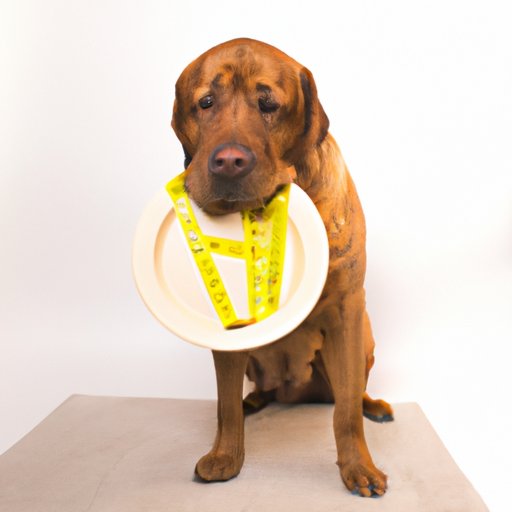Introduction
If you’re like millions of other pet owners, you want your pup to be in perfect health — and that means keeping them at a healthy weight. But how can you help your dog lose weight?
The fact is, many dogs are overweight or obese due to a lack of exercise, an unhealthy diet, or both. This can lead to serious health problems, including joint pain, diabetes, heart disease, and even cancer. Fortunately, there are steps you can take to help your pup reach and maintain a healthy weight.
In this article, we’ll explore how to help your dog lose weight safely and effectively. We’ll look at the importance of increasing exercise, reducing treats, monitoring food portions, switching to a low-calorie diet, and consulting with a veterinarian.
Increase Exercise
Exercise is essential to helping your dog lose weight. According to Dr. Mike Paul, DVM, “Daily exercise will boost your dog’s metabolism and help burn excess calories.”
Taking Daily Walks
The simplest way to increase your dog’s exercise is to take them on daily walks. According to the American Kennel Club, “A walk around the neighborhood is one of the best ways to get your dog active.” Make sure to plan for at least 30 minutes of walking per day.
Playing Fetch in the Backyard
Another great way to get your pup moving is to play fetch in the backyard. Playing fetch helps to engage your pup’s mind while providing them with physical activity. Make sure to choose a toy that is safe for your dog and appropriate for their size.
Reduce Treats
While treats can be a great way to reward your pup, it’s important to remember that they should only make up 10% of your dog’s daily caloric intake. If your dog is overweight, it’s important to reduce the amount of treats they’re getting.
Choosing Healthy, Low-Calorie Options
When choosing treats for your pup, look for healthy, low-calorie options such as carrots, apples, green beans, or frozen yogurt. You can also make your own healthy treats at home using ingredients like oats, pumpkin puree, peanut butter, and bananas.
Monitor Food Portions
It’s also important to monitor the amount of food you’re giving your pup each day. According to the American Kennel Club, “Overfeeding can cause your dog to gain weight quickly.”
Measuring Out Food Portions with a Measuring Cup
To ensure you’re not overfeeding your pup, measure out their food portions with a measuring cup. It’s important to follow the recommended serving size on the food package. If you’re unsure of how much to feed your pup, consult with your veterinarian.
Switch to a Low-Calorie Diet
Switching your pup to a low-calorie diet can also be beneficial in helping them reach and maintain a healthy weight. According to the American Veterinary Medical Association (AVMA), “Low-calorie diets are formulated to provide fewer calories than the average diet without sacrificing essential nutrients.”
Choosing a Diet Specifically Designed for Weight Loss
When choosing a low-calorie diet for your pup, look for one that is specifically designed for weight loss. These diets are typically lower in fat and higher in fiber, which helps your pup feel full longer. Make sure to read the label carefully to ensure the diet contains all the essential nutrients your pup needs.
Consult with a Veterinarian
Finally, it’s important to consult with a veterinarian before starting any new diet or exercise regimen. Your vet can provide you with personalized advice on the best diet and exercise plan for your pup.
Speaking with a Veterinarian About an Appropriate Diet and Exercise Plan
Your vet can also provide guidance on the amount of food and treats your pup should be eating each day. They can also recommend specific exercises that are suitable for your pup’s age and fitness level. It’s important to follow your vet’s recommendations to ensure your pup is losing weight in a safe and healthy way.
Conclusion
Helping your pup reach and maintain a healthy weight can be a challenge, but it’s possible with the right approach. Increase your pup’s exercise, reduce treats, monitor food portions, switch to a low-calorie diet, and consult with a veterinarian for personalized advice. With dedication and consistency, you can help your pup reach their ideal weight and enjoy a long, healthy life.
(Note: Is this article not meeting your expectations? Do you have knowledge or insights to share? Unlock new opportunities and expand your reach by joining our authors team. Click Registration to join us and share your expertise with our readers.)
